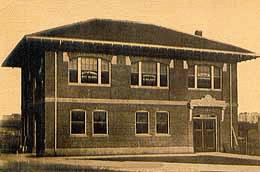On April 29, 1907, the town of Toppenish in Yakima County is incorporated. The settlement is located inside the Yakama Indian Reservation and is centered around a Northern Pacific railway depot, built in 1884. The incorporation vote, held earlier in the month, shows unanimous support for cityhood:100 votes in favor and zero against. Leonard Talbott (1867-1918) is elected the first mayor of Toppenish in the same election, by a vote of 105 to one. Toppenish subsequently experiences a population boom and by the 1910 census the town has grown to a population of 1,598. It becomes the biggest city on the Yakama Reservation and grows to a population of 8,949 in the 2010 census.
An Agricultural Center
Toppenish had for more than 20 years consisted of little more than the Northern Pacific's red-painted depot, built in 1884, and a few other buildings. It did not begin to thrive until several families of Indian blood -- who had been granted allotments near the depot in 1887 -- were permitted to sell town lots in 1905.
Toppenish was already an important railroad shipping center for livestock. When irrigation made the farmland bloom in the Yakima River valley, the town developed quickly into an agricultural center. The townspeople were clearly united behind the idea of cityhood. The incorporation election also included an unopposed ticket of candidates for the city's offices.
In addition to Mayor Talbott (whose name is misspelled as Talbot in the incorporation documents), the voters elected Levi J. Goodrich as the town's first treasurer and a slate of five men to sit on the first city council: A. J. Allphin, C. W. Grant, John R. Harvey, A. W. McDonald and James E. Townsend. The incorporation election was certified by the Yakima County commissioners on April 22, 1907, and filed with the Washington Secretary of State's office on April 29, 1907, making Toppenish cityhood official.
The first city council passed several notable ordinances. It prohibited the town's saloons -- and Toppenish had about 10 of them -- from occupying prime lots on the main street, Toppenish Avenue. It relegated saloons to the side streets. Also, much "to the comfort of morning sleepers " it put a stop to cows grazing on city lots with noisy cowbells (Johnson, p. 40). It also passed a tough new fire code in a mostly successful effort to rid the city of firetraps.

